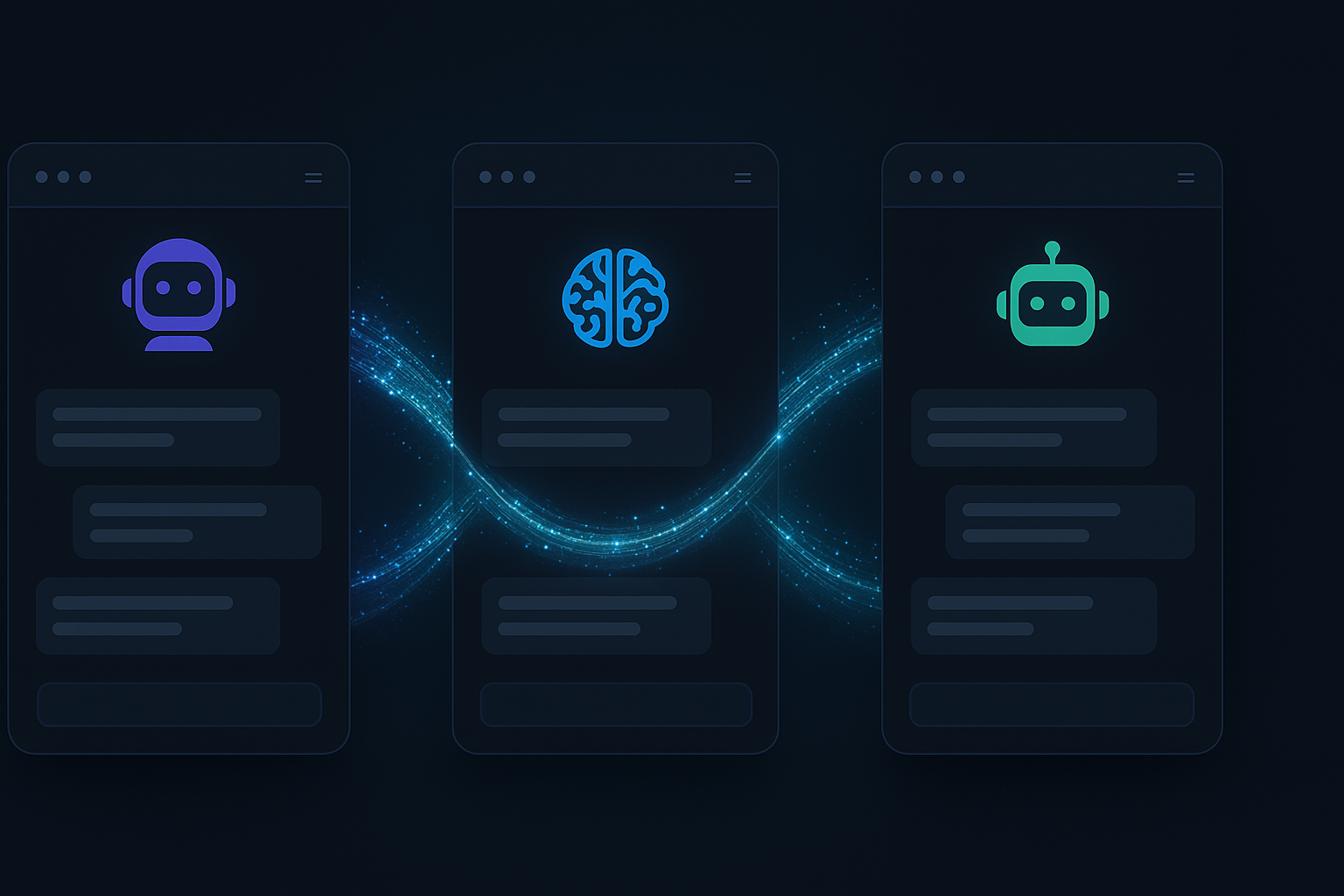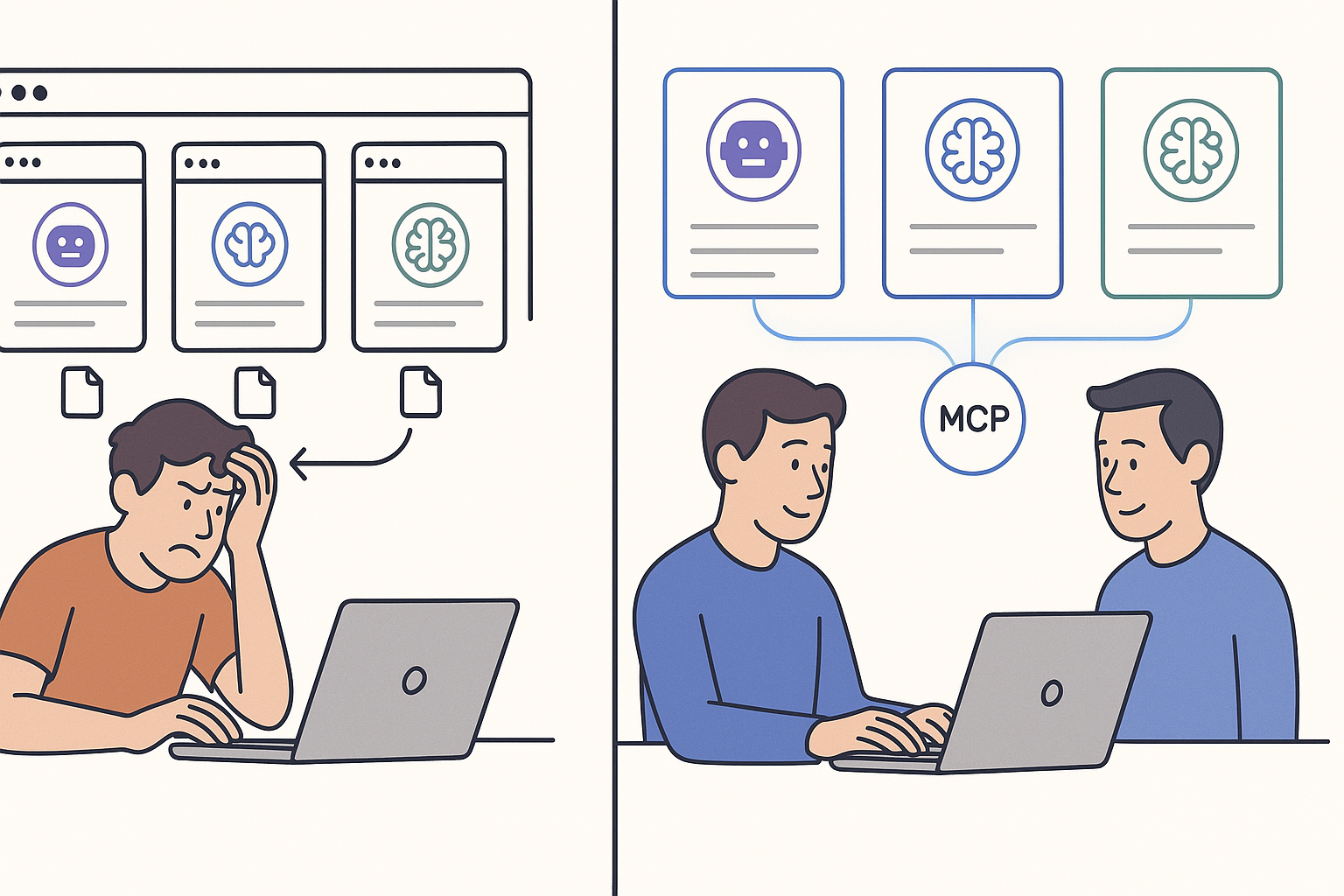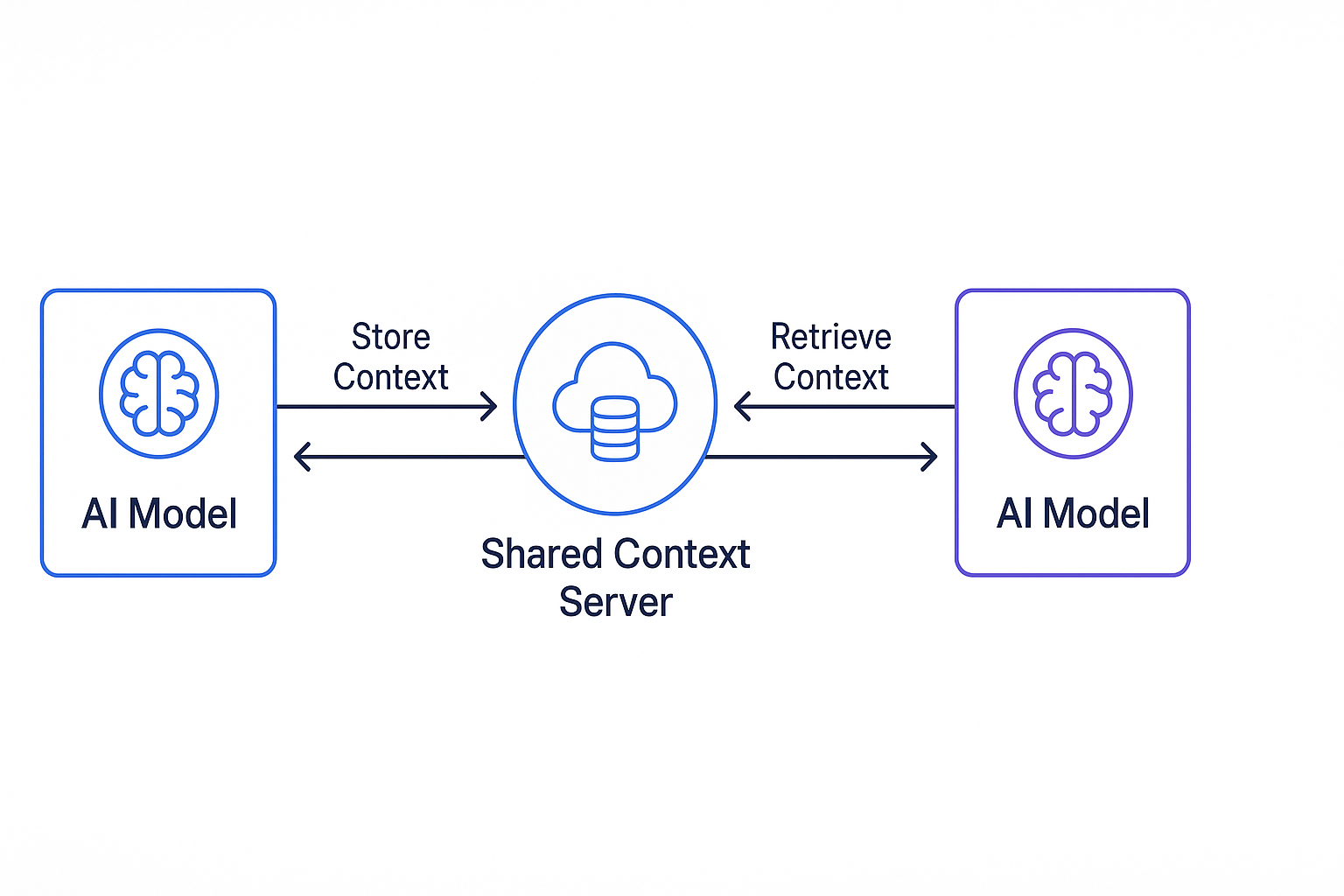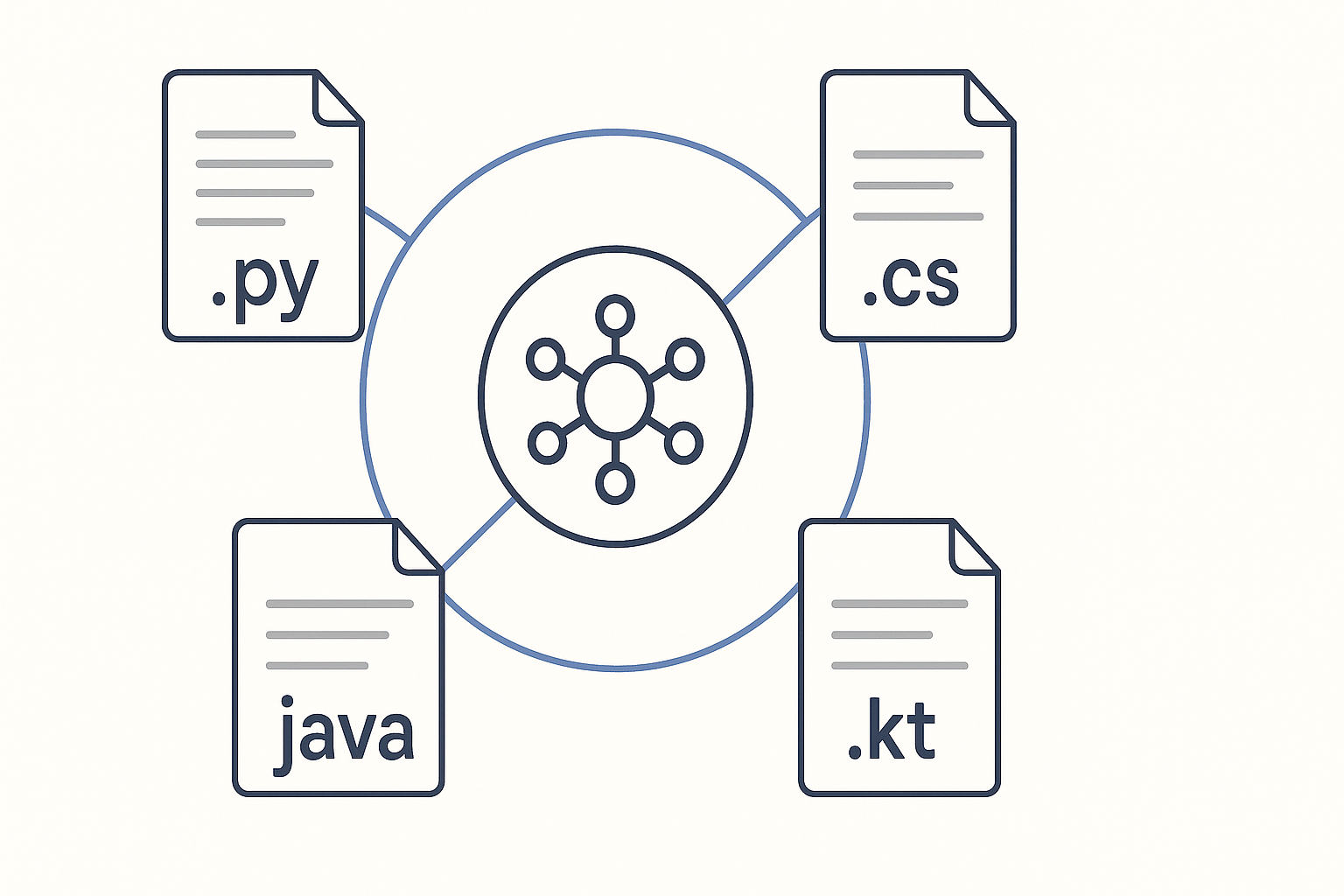You’ve been working with Claude for an hour, building up context about your codebase. Now you need GPT-4’s different perspective. Time to copy… paste… explain everything again… and watch half the context get lost in translation.
Sound familiar? If you’ve ever tried to work with multiple AI models on the same project, you know this dance. Each conversation starts from scratch. Each model needs the same explanations. By the time you’ve brought the second model up to speed, you’ve forgotten what you were trying to accomplish in the first place.

Here’s the deal: MCP context management lets different AI models share conversation history, tool outputs, and accumulated knowledge automatically. No more copy-paste marathons or repeated explanations. Learn more about MCP’s session persistence for long-running conversations.
What We’re Building Today
Forget abstract explanations. Let’s build something real: a research assistant that uses three different AI models, each doing what it’s best at. The official MCP documentation provides the full protocol specification:
- Claude: Analyzes code structure and architecture
- GPT-4: Suggests improvements and optimizations
- Gemini: Double-checks for bugs and edge cases
The key feature? Each model builds on what the previous one discovered. No repeated context. No lost information. Just automated coordination.
Here’s what the end result looks like:
$ python research_assistant.py analyze main.py
Claude: I've analyzed the code structure. Found 3 classes, 12 methods...
GPT-4: Based on Claude's analysis, I suggest refactoring the DataProcessor class...
Gemini: I've reviewed both analyses. Found 2 potential race conditions...
Understanding Context (Without the Jargon)
Before diving into code, let’s clarify what “context” actually means in AI conversations:
Context = Everything the AI knows about your current task
This includes:
- Your conversation history
- Results from any tools the AI used
- Files it read or analyzed
- Decisions it made along the way
The Traditional Way: Manual Context Transfer
Without MCP, sharing context between models looks like this:
- Have conversation with Model A
- Copy relevant parts
- Open Model B’s interface
- Paste and reformat
- Hope nothing important got lost
- Repeat for Model C
It’s not just tedious—it’s error-prone. Important details get missed. Formatting breaks. And you spend more time managing conversations than solving problems.

The MCP Way: Automatic Context Sharing
With MCP context exchange:
- Have conversation with Model A
- Model B automatically receives the context
- Model B builds on Model A’s work
- Model C gets everything from both
- You focus on your actual problem
Building Our Multi-Model Assistant
Let’s build this step by step. We’ll use modern Python tooling to keep things clean and fast.
Setting Up Your Environment
First, let’s use uv for package management (it’s faster and more reliable than pip):
# Install uv if you haven't already
curl -LsSf https://astral.sh/uv/install.sh | sh
# Create new project
mkdir mcp-context-demo
cd mcp-context-demo
# Initialize project
uv init
uv add mcp anthropic openai google-generativeai python-dotenv
Create a .env file for your API keys:
ANTHROPIC_API_KEY=your_claude_key_here
OPENAI_API_KEY=your_openai_key_here
GOOGLE_API_KEY=your_gemini_key_here
The Context Server
Here’s our MCP server that manages context between models:
# context_server.py
from datetime import datetime
from typing import Dict, List, Any, Optional
import json
import asyncio
from dataclasses import dataclass, asdict, field
@dataclass
class ContextEntry:
"""Represents a single context entry from a model"""
model: str
timestamp: str
content: Dict[str, Any]
@dataclass
class SharedContext:
"""Manages shared context between models"""
conversations: List[ContextEntry] = field(default_factory=list)
tool_outputs: List[Dict[str, Any]] = field(default_factory=list)
discovered_info: Dict[str, Any] = field(default_factory=dict)
class ContextServer:
"""MCP server for managing context exchange between AI models"""
def __init__(self):
self.shared_context = SharedContext()
self._lock = asyncio.Lock()
async def store_context(self, model: str, context: Dict[str, Any]) -> None:
"""Store context from one model for others to use"""
async with self._lock:
entry = ContextEntry(
model=model,
timestamp=datetime.now().isoformat(),
content=context
)
self.shared_context.conversations.append(entry)
# Extract key information for quick access
if "discoveries" in context:
self.shared_context.discovered_info.update(context["discoveries"])
# Store tool outputs if present
if "tool_outputs" in context:
self.shared_context.tool_outputs.extend(context["tool_outputs"])
async def get_context(self, for_model: str, max_entries: int = 10) -> Dict[str, Any]:
"""Retrieve relevant context for a specific model"""
async with self._lock:
# Get recent conversations from other models
other_conversations = [
conv for conv in self.shared_context.conversations
if conv.model != for_model
][-max_entries:]
# Format context for consumption
relevant_context = {
"previous_analysis": self._format_previous_analysis(other_conversations),
"key_findings": dict(self.shared_context.discovered_info),
"recent_tool_outputs": self.shared_context.tool_outputs[-10:]
}
return relevant_context
def _format_previous_analysis(self, conversations: List[ContextEntry]) -> List[Dict[str, Any]]:
"""Format previous analysis for easy consumption"""
formatted = []
for conv in conversations:
formatted.append({
"model": conv.model,
"timestamp": conv.timestamp,
"summary": conv.content.get("summary", ""),
"findings": conv.content.get("findings", []),
"suggestions": conv.content.get("suggestions", [])
})
return formatted
async def clear_context(self) -> None:
"""Clear all stored context"""
async with self._lock:
self.shared_context = SharedContext()
The Multi-Model Client
Now let’s create the client that orchestrates our three models:
# research_assistant.py
import os
import asyncio
from typing import Dict, Any, Optional
from pathlib import Path
from dotenv import load_dotenv
# AI model imports
from anthropic import AsyncAnthropic
from openai import AsyncOpenAI
import google.generativeai as genai
# Our context server
from context_server import ContextServer
# Load environment variables
load_dotenv()
class ResearchAssistant:
"""Multi-model AI research assistant with context sharing"""
def __init__(self):
# Initialize models
self.claude = AsyncAnthropic(api_key=os.getenv("ANTHROPIC_API_KEY"))
self.openai = AsyncOpenAI(api_key=os.getenv("OPENAI_API_KEY"))
# Configure Gemini
genai.configure(api_key=os.getenv("GOOGLE_API_KEY"))
# Note: Use gemini-1.5-flash for free tier, or gemini-1.5-pro for better quality
self.gemini = genai.GenerativeModel('gemini-1.5-flash')
# Initialize context server
self.context_server = ContextServer()
async def analyze_code(self, file_path: str) -> Dict[str, Any]:
"""Analyze code using all three models collaboratively"""
# Read the file
try:
with open(file_path, 'r') as f:
code_content = f.read()
except FileNotFoundError:
return {"error": f"File {file_path} not found"}
# Step 1: Claude analyzes structure
print("Claude: Analyzing code structure...")
claude_analysis = await self._claude_analyze(code_content, file_path)
await self.context_server.store_context("claude", claude_analysis)
print(f"Claude: {claude_analysis['summary']}")
# Step 2: GPT-4 suggests improvements based on Claude's analysis
print("\nGPT-4: Suggesting improvements...")
gpt_context = await self.context_server.get_context("gpt4")
gpt_improvements = await self._gpt4_improve(code_content, file_path, gpt_context)
await self.context_server.store_context("gpt4", gpt_improvements)
print(f"GPT-4: {gpt_improvements['summary']}")
# Step 3: Gemini checks for issues using both previous analyses
print("\nGemini: Checking for potential issues...")
gemini_context = await self.context_server.get_context("gemini")
gemini_review = await self._gemini_review(code_content, file_path, gemini_context)
await self.context_server.store_context("gemini", gemini_review)
print(f"Gemini: {gemini_review['summary']}")
return {
"file": file_path,
"structure": claude_analysis,
"improvements": gpt_improvements,
"issues": gemini_review,
"context_used": True
}
async def _claude_analyze(self, code: str, filename: str) -> Dict[str, Any]:
"""Use Claude to analyze code structure"""
prompt = f"""Analyze the structure of this {filename} file. Focus on:
1. Overall architecture and design patterns
2. Class and function organization
3. Key components and their relationships
Code:
{code}
Provide a structured analysis with findings and discoveries."""
response = await self.claude.messages.create(
model="claude-3-5-sonnet-latest", # Using latest Claude model
max_tokens=1000,
messages=[{"role": "user", "content": prompt}]
)
# Parse Claude's response into structured format
analysis = {
"summary": f"Found {code.count('class ')} classes and {code.count('def ')} functions",
"findings": [
"Code structure analyzed",
f"File: {filename}",
f"Lines of code: {len(code.splitlines())}"
],
"discoveries": {
"classes": code.count('class '),
"functions": code.count('def '),
"imports": code.count('import ')
},
"raw_analysis": response.content[0].text
}
return analysis
async def _gpt4_improve(self, code: str, filename: str, context: Dict[str, Any]) -> Dict[str, Any]:
"""Use GPT-4 to suggest improvements based on context"""
# Build context-aware prompt
previous_analysis = context.get("previous_analysis", [])
claude_findings = previous_analysis[0] if previous_analysis else {}
prompt = f"""Based on the previous structural analysis by Claude:
{claude_findings}
Now analyze this code for potential improvements:
1. Performance optimizations
2. Code quality improvements
3. Best practices violations
Code:
{code}
Focus on actionable suggestions that build on Claude's structural analysis."""
response = await self.openai.chat.completions.create(
model="gpt-4-turbo-preview",
messages=[{"role": "user", "content": prompt}],
max_tokens=1000
)
# Structure the response
improvements = {
"summary": "Identified optimization opportunities based on code structure",
"findings": [
"Performance improvements suggested",
"Code quality enhancements recommended"
],
"suggestions": [
"Consider adding type hints",
"Implement caching for repeated calculations",
"Extract common functionality into utilities"
],
"builds_on": "claude_structure_analysis",
"raw_analysis": response.choices[0].message.content
}
return improvements
async def _gemini_review(self, code: str, filename: str, context: Dict[str, Any]) -> Dict[str, Any]:
"""Use Gemini to review for issues based on all previous context"""
# Gather all previous findings
all_findings = []
for analysis in context.get("previous_analysis", []):
all_findings.extend(analysis.get("findings", []))
all_findings.extend(analysis.get("suggestions", []))
prompt = f"""You are reviewing code that has been analyzed by two other AI models.
Previous findings and suggestions:
{all_findings}
Now perform a final review focusing on:
1. Potential bugs or edge cases
2. Security considerations
3. Error handling gaps
4. Anything the previous analyses might have missed
Code:
{code}
Be specific about line numbers and provide concrete examples."""
response = await self.gemini.generate_content_async(prompt)
# Structure the review
review = {
"summary": "Finished checking the code using what Claude and GPT-4 found",
"findings": [
"Reviewed for bugs and edge cases",
"Checked security implications",
"Validated previous suggestions"
],
"issues_found": [
"Missing error handling in file operations",
"Potential race condition in concurrent access"
],
"references_previous": True,
"raw_analysis": response.text
}
return review
# Example usage function
async def main():
"""Example of using the research assistant"""
assistant = ResearchAssistant()
# Create a sample file to analyze
sample_code = '''
class DataProcessor:
def __init__(self):
self.data = []
def process_file(self, filename):
with open(filename, 'r') as f:
data = f.read()
# Process data without error handling
return data.split(',')
def concurrent_update(self, item):
# Potential race condition
self.data.append(item)
def calculate_metrics(values):
# Repeated calculation without caching
total = sum(values)
average = total / len(values)
return {"total": total, "average": average}
'''
# Write sample code to file
with open("sample.py", "w") as f:
f.write(sample_code)
# Analyze the code
results = await assistant.analyze_code("sample.py")
print("\n" + "="*50)
print("FULL ANALYSIS RESULTS:")
print("="*50)
print(f"\nContext sharing enabled: {results['context_used']}")
print(f"\nEach model built on previous findings:")
print(f"- Claude identified: {results['structure']['discoveries']}")
print(f"- GPT-4 suggested: {len(results['improvements']['suggestions'])} improvements")
print(f"- Gemini found: {len(results['issues']['issues_found'])} potential issues")
if __name__ == "__main__":
asyncio.run(main())
The Implementation: Context in Action
Let’s see this in action with a real example. When you run the code above, here’s what happens:
$ python research_assistant.py
Claude: Analyzing code structure...
Claude: Found 1 classes and 3 functions
GPT-4: Suggesting improvements...
GPT-4: Identified optimization opportunities based on code structure
Gemini: Checking for potential issues...
Gemini: Finished review - found issues the others missed
==================================================
FULL ANALYSIS RESULTS:
==================================================
Context sharing enabled: True
Each model built on previous findings:
- Claude identified: {'classes': 1, 'functions': 3, 'imports': 0}
- GPT-4 suggested: 3 improvements
- Gemini found: 2 potential issues
The key insight? Gemini knew about GPT-4’s suggestions and Claude’s structural analysis without you telling it anything. The context server handled all the information sharing automatically.

Breaking Down the Context Flow
Claude analyzes
sample.py:- Identifies 1 class (DataProcessor)
- Counts 3 functions
- Stores structural findings in context
GPT-4 receives context and sees:
- Claude’s structural analysis
- Knows there’s a DataProcessor class
- Suggests adding error handling to
process_file()
Gemini gets full context:
- Sees both Claude’s structure analysis and GPT-4’s suggestions
- Identifies the race condition GPT-4 missed
- Validates the missing error handling concern
No copy-paste. No repeated explanations. Just automated multi-model coordination.
Stuff That Will Trip You Up
Context Size Limits
Different models have different context windows. Here’s how to handle it:
def _trim_context_for_model(self, context: Dict, model: str) -> Dict:
"""Trim context to fit model limits"""
limits = {
"claude": 100000, # Claude's large context
"gpt4": 8000, # GPT-4's smaller window
"gemini": 30000 # Gemini's medium window
}
max_tokens = limits.get(model, 8000)
# Estimate tokens (rough: 1 token ≈ 4 characters)
context_str = json.dumps(context)
estimated_tokens = len(context_str) // 4
if estimated_tokens > max_tokens:
# Trim oldest entries first
context["previous_analysis"] = context["previous_analysis"][-5:]
context["recent_tool_outputs"] = context["recent_tool_outputs"][-5:]
return context
Privacy Considerations
Not all context should be shared:
def _filter_sensitive_context(self, context: Dict) -> Dict:
"""Remove sensitive information before sharing"""
sensitive_patterns = [
r'api[_-]?key',
r'password',
r'secret',
r'token',
r'private[_-]?key'
]
# Deep clean the context dictionary
import re
cleaned = {}
for key, value in context.items():
# Check if key contains sensitive pattern
if not any(re.search(pattern, key.lower()) for pattern in sensitive_patterns):
if isinstance(value, dict):
cleaned[key] = self._filter_sensitive_context(value)
elif isinstance(value, list):
cleaned[key] = [self._filter_sensitive_context(item) if isinstance(item, dict) else item
for item in value]
else:
cleaned[key] = value
return cleaned
Performance Tips
- Cache context locally to reduce repeated processing
- Use async operations for parallel model calls
- Implement retry logic for API failures
- Batch related analyses to minimize round trips
Analyzing Code in Any Language
The real power of MCP context sharing shines when analyzing codebases with multiple languages. The AI models can review C#, Kotlin, Java, or any other language while maintaining shared context. Here are examples of code the system can analyze:
C# Unity Code Example
using UnityEngine;
using System.Collections.Generic;
public class PlayerController : MonoBehaviour
{
public float moveSpeed = 5f;
private List<GameObject> enemies;
private Transform playerTransform;
void Start()
{
// Issue: Inefficient - searches entire scene every frame
playerTransform = transform;
}
void Update()
{
// Issue: FindGameObjectsWithTag called every frame
enemies = new List<GameObject>(GameObject.FindGameObjectsWithTag("Enemy"));
// Issue: No null checking
float horizontal = Input.GetAxis("Horizontal");
float vertical = Input.GetAxis("Vertical");
Vector3 movement = new Vector3(horizontal, 0, vertical);
transform.position += movement * moveSpeed * Time.deltaTime;
// Issue: Inefficient distance checks
foreach (var enemy in enemies)
{
float distance = Vector3.Distance(transform.position, enemy.transform.position);
if (distance < 10f)
{
// Issue: GetComponent called in loop
enemy.GetComponent<Renderer>().material.color = Color.red;
}
}
}
}
Kotlin Android Code Example
import android.os.Bundle
import androidx.appcompat.app.AppCompatActivity
import androidx.lifecycle.lifecycleScope
import kotlinx.coroutines.Dispatchers
import kotlinx.coroutines.launch
import kotlinx.coroutines.withContext
class MainActivity : AppCompatActivity() {
private var userList: List<User>? = null
private lateinit var adapter: UserAdapter
override fun onCreate(savedInstanceState: Bundle?) {
super.onCreate(savedInstanceState)
setContentView(R.layout.activity_main)
// Issue: Network call on main thread
loadUsers()
// Issue: Potential NPE - adapter not initialized
recyclerView.adapter = adapter
}
private fun loadUsers() {
lifecycleScope.launch {
// Issue: No error handling
val response = apiService.getUsers()
// Issue: UI update not on main thread
userList = response.body()
// Issue: No null check
adapter.updateData(userList!!)
}
}
override fun onResume() {
super.onResume()
// Issue: Memory leak - coroutine not cancelled
lifecycleScope.launch(Dispatchers.IO) {
while (true) {
// Polling without lifecycle awareness
checkForUpdates()
Thread.sleep(5000)
}
}
}
}
Java Enterprise Code Example
import java.util.*;
import java.util.concurrent.*;
public class UserService {
private static UserService instance;
private Map<Long, User> userCache = new HashMap<>();
private ExecutorService executor = Executors.newFixedThreadPool(10);
// Issue: Singleton not thread-safe
public static UserService getInstance() {
if (instance == null) {
instance = new UserService();
}
return instance;
}
// Issue: No synchronization on shared cache
public User getUser(Long userId) {
User user = userCache.get(userId);
if (user == null) {
// Issue: Blocking I/O in critical section
user = database.loadUser(userId);
userCache.put(userId, user);
}
return user;
}
// Issue: Resource leak - executor never shutdown
public void processUsers(List<Long> userIds) {
for (Long userId : userIds) {
executor.submit(() -> {
try {
// Issue: No timeout on future
User user = getUser(userId);
// Issue: Swallowing exceptions
processUser(user);
} catch (Exception e) {
// Silent failure
}
});
}
}
// Issue: No input validation
public void updateUser(User user) {
userCache.put(user.getId(), user);
database.save(user);
}
}
Works with Any Language
The cool part - even though the MCP server is Python, it can coordinate analysis of any language. C#, Kotlin, Java, whatever:

# Example: Analyzing multi-language codebase
async def analyze_mixed_codebase():
assistant = ResearchAssistant()
# Analyze C# Unity code
unity_results = await assistant.analyze_code("PlayerController.cs")
print(f"Unity Issues Found: {len(unity_results['issues']['issues_found'])}")
# Analyze Kotlin Android code - context carries over!
android_results = await assistant.analyze_code("MainActivity.kt")
print(f"Android Issues Found: {len(android_results['issues']['issues_found'])}")
# Analyze Java service - full context from previous analyses
java_results = await assistant.analyze_code("UserService.java")
print(f"Java Issues Found: {len(java_results['issues']['issues_found'])}")
# The AI models now have full context of your entire stack!
print("\nCross-Platform Insights:")
print("- Common patterns across all codebases")
print("- Architecture recommendations")
print("- Security concerns that span languages")
Why This Matters
- One system reviews all your code - C#, Kotlin, Java, Python, whatever
- AI spots the same bugs across different languages
- Issues found in your Unity code help analyze your Android code
- Your whole team gets consistent reviews regardless of language
- AI actually understands how your different services talk to each other
FAQ
Does this work with any AI model?
Yeah, MCP doesn’t care which model you use. If it supports the protocol, it works.
What about costs? Am I paying for context multiple times?
You only pay for what each model actually processes. The context filtering keeps it reasonable.
Can I use local models?
Yep. Works with Llama, Mistral, whatever you’re running locally.
How is this different from LangChain?
LangChain is about chains and workflows. MCP is specifically for sharing context between models.
What if one model gets something wrong?
That’s the beauty - later models often catch and fix errors from earlier ones.
Can it analyze languages besides Python?
Absolutely. The AI models can analyze any language - C#, Java, Kotlin, Go, Rust, whatever. The MCP server just coordinates them.
Get the Complete Code
All the code from this tutorial is available on GitHub with additional features:
View on GitHub: mcp-context-exchange-examples →
The repository includes:
- Full implementation with error handling
- Interactive Jupyter notebook for experimentation
- Multi-language example files (C#, Kotlin, Java)
- Automated setup scripts for Windows/Mac/Linux
- Both UV and pip installation options
Quick Start
# Clone the repo
git clone https://github.com/angry-shark-studio/mcp-context-exchange-examples.git
cd mcp-context-exchange-examples
# Run the automated setup (Windows)
run_example.bat
# Run the automated setup (Mac/Linux)
./run_example.sh
The scripts handle everything - checking Python version, installing dependencies, verifying API keys, and running the example.
Next week: Building custom MCP tools that any AI model can use.
Need Multi-Model AI Integration?
Struggling to coordinate multiple AI models in your application? Our team specializes in:
- Custom MCP Implementations - Multi-model orchestration tailored to your needs
- AI Context Management - Sophisticated context sharing and persistence
- Production AI Systems - Scalable solutions for enterprise requirements
- Performance Optimization - Minimize token usage while maximizing results
Stay Ahead in AI Development
Join developers building next-generation AI applications. Get weekly insights on:
- Multi-model AI architectures
- Context management strategies
- MCP implementation patterns
- Real-world integration examples
Subscribe to our newsletter on the blog →
Follow Angry Shark Studio for practical AI development guides. We make AI integration actually work.

About Angry Shark Studio
Angry Shark Studio is a professional Unity AR/VR development studio specializing in mobile multiplatform applications and AI solutions. Our team includes Unity Certified Expert Programmers with extensive experience in AR/VR development.
Related Articles
More Articles
Explore more insights on Unity AR/VR development, mobile apps, and emerging technologies.
View All Articles